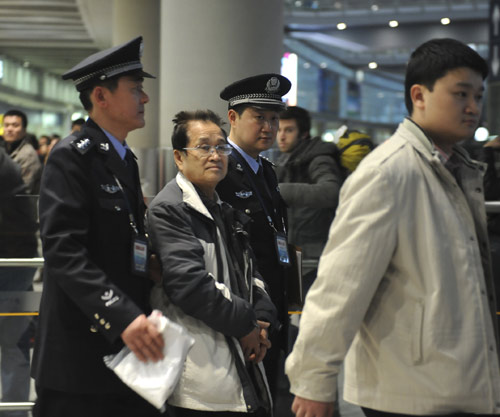2011flash
Top fugitive returned after 12 years
Updated: 2011-02-19 08:25
By Zhang Yan (China Daily)
|
 Zeng Hanlin (second from left) arrives at Beijing Capital International airport on Thursday afternoon after being deported by Canada. [Photo/Xinhua]
|
The 65-year-old, who will face trial for an alleged $8-million stock fraud, was put on a non-stop flight from Toronto on Wednesday and arrived at the Beijing Capital International Airport on Thursday.
"Thanks to the joint efforts of Chinese and Canadian police, Zeng was repatriated after fleeing China 12 years ago," Xiao Zuosheng, a press officer for the ministry, said on Friday.
| ||||
Roughly 580 of China's economic fugitives are still at large in foreign countries, with most fleeing to North America and Southeast Asia. Zeng is one of the top 10 fugitives facing charges of economic fraud.
From 1997 until 1998, Zeng, a native of Guangdong province, worked as the chief executive at Guangdong Feilong Group, which specializes in transport services and machinery production.
During that time, he used forged bank savings statements and fake remittance certificates to sign equity transfer agreements with Chengdu Lianyi Industrial Company in Sichuan province, swindling stocks worth 65 million yuan ($9.8 million), according to a report by Xinhua News Agency.
He fled to Canada, where in June 2004 he was arrested for failing to have a valid visa. He applied for refugee status but the Canadian government rejected his request due to his probable connection with crime, Xinhua reported.
Last month, Canada completed its risk assessment for Zeng's repatriation and decided to deport him to China. Zeng's lawyer tried to have the order revoked, citing a possible death sentence or torture, but failed.
Canada's Federal Court said Zeng would only face a charge of contract fraud and serve a limited prison term, adding that concern over an extreme penalty is sheer speculation, Xinhua reported.
Meng Qingfeng, a top economic crime investigator with the Ministry of Public Security, told China Daily that the biggest legal hurdle in repatriating fugitives is the absence of extradition treaties between China and some Western nations.
Trying to get fugitives back via other channels, such as immigration laws, is more complex and involves lengthy procedures, he said.
China has signed extradition treaties with 37 countries and criminal justice agreements with 47 others, he said, although the ministry hopes to improve cooperation with the international community and reach extradition treaties with more countries.
"China will adhere to relevant international conventions to protect the human rights and other legitimate rights of fugitives in line with China's laws and regulations," said Meng, who urged fugitives to turn themselves in, insisting they will be treated in a just manner by judicial departments in the legal framework.
Huang Feng, a criminal law professor at Beijing Normal University, said on Friday that the Western world "should understand and take a fair attitude on China's criminal justice system and its application of the proper law procedures".
China needs to prevent suspects from fleeing to other countries while enhancing criminal justice cooperation with international society, he added.
Specials

Spring Festival
The Spring Festival is the most important traditional festival for family reunions.

Top 10
A summary of the major events both inside and outside China.

A role model
Alimjan Halik had been selected as the "Cyberspace Personality Who Moved the Hearts of the Chinese in 2010".

